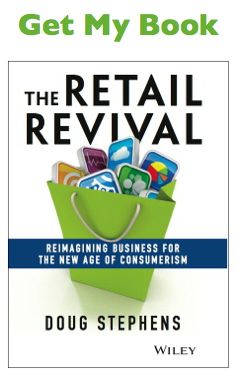By Doug Stephens

Believe it or not, the average power drill is used for a total of 15 minutes over the course of its lifetime. And that’s not unusual. Our cars, many household items and even our homes spend much of their time idle, empty or unused. It all adds up to incalculable amounts of unused capacity, utility and value.
But what if that same power drill could be shared between four households? What if one car could provide transportation for a dozen people instead of just one? What if a home could be shared so that it’s almost always occupied?
What I’m describing is what is now commonly being referred to as “the sharing economy” and it has the potential to significantly reshape our entire concept of consumption and ownership.
Sharing Economy Defined
Rachel Botsman, author of What’s Mine Is Yours: The Rise of Collaborative Consumption, describes the sharing economy as an economic model based on sharing under-utilized assets from spaces to skills to stuff for monetary or non-monetary benefits. And as her book title suggests, the sharing trend is finding root in almost all aspects of the consumer market.
Lyft, RelayRides and Sidecar connect people who need a ride with people who have cars and are willing to drive them.
Neighborgoods connects people living within a neighborhood to share, sell and rent household items.
JumpSeat sells trips on otherwise empty private jets.
TaskRabbit lets people hire others to run errands and complete everyday tasks for a fee, thus turning peoples’ idle time into a source of income.
Airbnb is a fast-growing network that allows users to share vacant living spaces (and incidentally, now books more nights globally than the Hilton Hotel chain).
Why is this happening now? Why is it happening at all?
First, there is no doubt that the financial collapse of 2008 caused many of us to reconsider our attitudes toward acquisition and ownership. In fact, many post-recession studies found a strong desire among consumers to shed much of the “stuff” in their lives, to simplify and diminish their material load. Ownership, once regarded as the hallmark of independence is increasingly being eschewed as a burden compared to the relative ease and lightness of sharing.
Secondly, the sluggish global economy and tepid labor markets have put many in a position where they can simply no longer afford to own their cars, homes or other assets without reclaiming some of their value through sharing. The average Airbnb host in San Francisco for example, rents out their home an average of 58 nights per year, providing them with $9,300.00 in incremental income. Car owners using RelayRides make an average of $250.00 per month – a monthly lease payment for some.
Lastly, the pervasiveness of online networks, communities and platforms have made self-organization of sharing networks easy and scalable. The ability to not only connect two parties looking to share, but also facilitate communication, collaboration and payment has never been easier.
Who it helps and who it hurts?
So, what are the impacts of this new mode of commerce on the economy? Who benefits and who stands to lose by it?
First the financial impact; 2013 estimates for sharing economy transactions suggest approximately 3.5 billion will change hands with growth projected to $110 billion over the next few years, compounding at the astonishing rate upwards of up to 20% per year.
Second, and perhaps more important is the steady disintermediation of large institutions whose revenue models have been based on centralizing and redistributing a supply of shared assets. For example, all that car rental companies such as Avis, Hertz and Budget really did was organize and systematize the sharing of vehicles for short-term use. They brought order to what would have otherwise been chaos in renting a car. There was inherent value in this model of systemization 30 years ago because that was not something that we, as consumers, could manage ourselves. Now, however, we can. Power that once resided with the large corporation is now being redistributed across networks. With it, the revenue that was once apportioned to the middle-man (Avis, Budget, and Hertz) can now be retained and split between the parties directly owning and sharing the asset – both in in the forms of income and cost savings off conventional rental rates. What used to be a huge markup in the middle, is now often no more than a nominal transaction fee taken by the sharing network.
From Corporations to Networks
And so it goes; this pattern of disintermediation is repeating itself across different product and service categories. Hotel chains are no longer vital to organizing short-term accommodation, banks are no longer essential to brokering short-term loans, transit commissions are no longer mandatory for systematizing short-term transportation. And the profit given up by these entities can now be redistributed between the sharing parties.
For many manufacturers and retailers the sharing economy is a frightening prospect. It’s reasonable to assume that the more sharing that takes place, the less new product we actually need to meet demand, resulting in fewer dollars changing hands at retail. Others would argue that some or more of that lost wholesale and retail value is simply reallocated to the owner of the item, who  rents it to others and those renters, who having saved money, can spend the surplus on other goods and services. In other words, the equivalent value to the economy of 2 units of an item may now be derived over the long-term from one. Thus, sharing also presents a strong case for sustainability. Maximizing the capacity of the assets we have versus simply creating ever-more assets offers the potential to significantly reduce our impact on the planet. While there may indeed be some victims of the sharing economy, many experts see no valid reason for an overall economic contraction, merely a reshaping.
rents it to others and those renters, who having saved money, can spend the surplus on other goods and services. In other words, the equivalent value to the economy of 2 units of an item may now be derived over the long-term from one. Thus, sharing also presents a strong case for sustainability. Maximizing the capacity of the assets we have versus simply creating ever-more assets offers the potential to significantly reduce our impact on the planet. While there may indeed be some victims of the sharing economy, many experts see no valid reason for an overall economic contraction, merely a reshaping.
We can’t un-see the future
Lastly of course, there are the regulatory and taxation impacts, with governments and unions struggling in many jurisdictions to put the sharing genie back in its bottle. Ride sharing companies in particular have become the canary in the coal mine, with many being fined, cited, sued and threatened. While the net effect of all this short-term pushback remains to be seen one can’t help but notice how Napster-esque this all feels. The fines, court battles and injunctions all seem a mere forestalling of the inevitable. The sharing economy, it would appear, is here to stay.
AUDIO: To listen to my CBC Radio interview on this subject, click HERE
Footnote: Just prior to writing this article I booked a stay in a loft apartment in Montreal via Airbnb. The process was simple, secure and significantly more affordable than available hotel alternatives.

